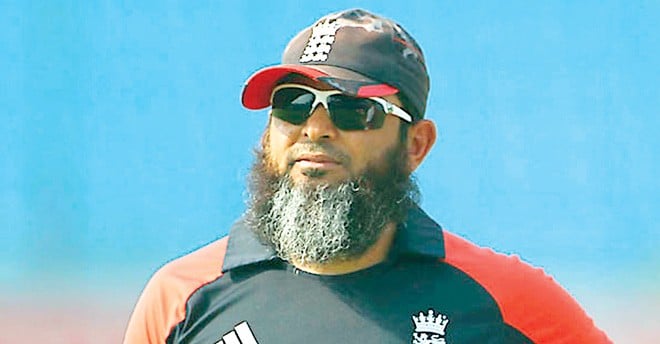

Mushtaq Ahmed was the first cricketer I interviewed. It was 1996 and Pakistan had just defeated England in the Test at Lord’s. Mushtaq spoke freely, almost at random. He was not yet an evangelical Muslim but he was already a hero, a World Cup winner in that famous year of 1992.
Manchester United have a Class of ‘92, Giggs, Scholes, Beckham et al, and Pakistan have their own. By a twist of fate, a cruel injury, Waqar Younis missed that World Cup campaign. But when he returned to cricket later in the year it felt like a second coming. Waqar was an utter sensation at the start of his career. He was pretty good after 1992, a world-class fast bowler, but he never quite recaptured the speed and the domination of his early years. Incidentally, Waqar was the second cricketer I interviewed. In contrast to Mushtaq, he didn’t say much. He didn’t need to, his feats spoke loudly enough.
Now those once-unsullied heroes of Pakistan cricket, are reunited at the helm. Waqar is national coach, Mushtaq his spin bowling ally. Moin Khan, class of ‘92 again, chairman of selectors. Thinking ahead during that 1992 bubble, a future combination of Waqar and Mushtaq might have seemed an unlikely prospect. Much can happeen in 22 years; strangely, more has happened than anybody ever expected.
It was during that tour of 1996 that I first heard rumours of corruption. Players, administrators, everybody was knee-deep in trouble, I was told, and they had been for many years. I found it hard to believe at the time. Indeed, I didn’t believe it. These were men fighting for their country’s honour, living the dream that any young Pakistani would want to live. Corruption wasn’t possible when so much pride was at stake, was it?
Apparently it was. Three years later and the 1999 World Cup delivered a thrilling spectacle, haunted by the spectre of match-fixing. Pakistan’s collapse in the final at Lord’s prompted an inquiry, although defeat to Bangaldesh in Northampton raised more eyebrows. I was at both games, and it was almost impossible to doubt the integrity of the players. Cricket is full of unpredictability and mad moments. Any batsman or bowler is only a heartbeat away from a rash decision, a moment of doubt, a failure of technique and timing, especially at the highest level. How can we watch and hypothesise with any confidence about intentions?
Justice Malik Qayyum, a lawyer known for high-profile political trials, conducted a judicial inquiry into the allegations against Pakistan’s cricketers, essentially the class of ‘92. Imran Khan and Javed Miandad, fortunately for their reputations, were well retired and well out of it.
Qayyum’s was a curious inquiry and a more curious judgement. Saleem Malik and Ata-ur Rehman were banned. A host of others, including Waqar, Mushtaq and Wasim Akram, were criticised.
Some commentators said Qayyum had ruined reputations without evidence. Others were dismayed at how fashionable players were able to continue their careers; Malik and Rehman, unloved and un-powerful by contrast, were easy targets. A third view was that Qayyum had handled a difficult inquiry with considerable skill and pitched the verdicts perfectly. Looking back, it seems improbable that Qayyum overestimated the extent of corruption or the extent of involvement of players.
Worse still, his judgements created confusion. Mushtaq was one of the players who, Qayyum recommended, "be censured, kept under close watch and be not given any office of responsibility". Some prohibition; Mushtaq has coached England and is now with Pakistan. First the ECB and then the PCB, despite the ICC’s anti-corruption rhetoric, employed Mushtaq in defiance of Qayyum’s verdict. Of course, Qayyum might have got it wrong. Mushtaq, if ever guilty, may be a reformed character. We need to move on.
We live in a world that favours redemption over perpetual damnation, and rightly so. Nonetheless there was no statute of limitation on Qayyum’s recommendations, yet they are paid little heed, conveniently filed away in the inconvenient-truths department of international cricket administration.
Two uncomfortable conclusions emerge. First, the ICC and its member boards are less serious about corruption in cricket than they pretend to be. The man who told anybody who cared to listen that corruption began at the top, the late Imtiaz Sipra of ‘The News’, perhaps had a point? Second, the PCB has no interest in the outcomes and recommendations of its own inquiries.
What system tolerates such low standards? How is it possible to respect a governing body that operates with such expediency?
The rule of Pakistan cricket, like Pakistan itself, follows political and personal whims. There are no grand visions or notions of honour among the powerful. To expect people to act on principle is depressingly delusional.
Mohsin Khan recently questioned the PCB’s decision-making processes when he was overlooked for the post of head coach. He wasn’t even interviewed. We know you well, said his old team-mate Zaheer Abbas, and we chose a better man. Waqar might be a better man, but Mohsin’s record, the best of any recent coach, deserved a proper hearing, an opportunity for a former dashing opening batsman to show his class.
In truth, nobody expects a fair process from the PCB, be it in player selection or board appointment. There are no higher ethics being applied, there is no shame in hiring people with questionable backgrounds.
This isn’t an attempt to demonise Mushtaq Ahmed. Who couldn’t fail to feel a tinge of sympathy and affection for a born-again cheeky chappie such as he? But actions speak louder than words, and the cricket boards of England and Pakistan, as well as the ICC, distance themselves from credibility at each test of integrity.
Cricket is a game built on nobility, honour, and a reponsibility to do the right thing. It is a tragedy that these values are no longer even skin-deep.
--Cricinfo